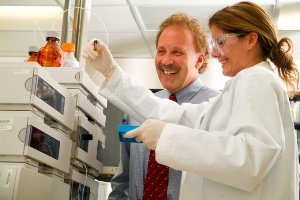Nov 4 2013
UB’s HIV Clinical Pharmacology Research Program has received several grants totaling $1.86 million from the National Institutes of Health (NIH) to fund new initiatives and partnerships in hepatitis C virus (HCV) drug development, nanomedicine research for tuberculosis (TB) and pharmacogenomics of neurocognitive disorders for people with HIV/AIDS, as well as to extend ongoing research projects.
 Gene Morse (left), the grants' principal investigator, directs the AIDS Clinical Trials Group Clinical Pharmacology Core. Photo: Douglas Levere
Gene Morse (left), the grants' principal investigator, directs the AIDS Clinical Trials Group Clinical Pharmacology Core. Photo: Douglas Levere
The grants’ principal investigator and director is Gene D. Morse, professor of pharmacy practice and associate director of UB’s New York State Center of Excellence in Bioinformatics and Life Sciences (CoE).
“The awards provide additional funding for the UB program while also expanding our HIV pharmacology research to include drug development for hepatitis C and tuberculosis,” says Morse.
Morse currently directs the AIDS Clinical Trials Group (ACTG) Clinical Pharmacology Core, a network of laboratories that includes pharmacology specialty laboratories (PSL) in the U.S., Thailand and Africa. Morse is also a member of the ACTG Executive Committee and a member of the ACTG Viral Hepatitis Transformative Science Group.
Some of the funds will be used to support UB’s HIV PSL, which has received continuous NIH support since 1987.
The UB PSL contributes to clinical pharmacology studies that investigate new drug treatments and designs, and participates in drug interaction research during new drug development programs. The UB PSL operates a bioanalytical laboratory that develops and validates drug assays using innovative applications of liquid chromatography and mass spectrometry.
The new PSL collaborations in ACTG research include pharmaceutical partners such as U.S.-based Merck (Philadelphia), AbbVie (Chicago) and ITherX (San Diego).
A new, competitive funding supplement also was awarded to the PSL and includes UB’s Paras N. Prasad, SUNY Distinguished Professor of Chemistry, Physics, Medicine and Electrical Engineering, and executive director of UB’s Institute for Lasers, Photonics and Biophotonics (ILPB).
This project will bring together the PSL’s bioanalysis techniques with ILPB’s extensive nanoparticle experience to create new nanomedicine formulations that incorporate drugs for tuberculosis using cell-targeted approaches. These approaches deliver medications directly to the site of TB infection in the lungs. The work will be conducted in the IPLB and the CoE’s new nanomedicine laboratory in collaboration with Jessica Reynolds from the Division of Clinical Immunology in UB’s Clinical and Translational Research Center.
Funding also is included to continue the expansion of the UB PSL Precautionary and Prohibited Medications Database, a pharmacoinformatics database that identifies new clinical pharmacology studies of drug interactions among HIV, HCV and TB drugs during drug development.
It will integrate new research data with an informatics utility that is based in the CoE’s Translational Pharmacology Research Core. This utility is used by NIH investigators for developing new treatment protocols that access the most current drug interaction data available, thus promoting the safety and protection of subjects who participate in these clinical studies.
The NIH funding additionally supports a new Mentored Research award for Qing Ma, research scientist in the CoE’s Translational Pharmacology Research Core and an investigator in the UB PSL. Ma has received a five-year, K08 award titled “Genetic Risk of Neurocognitive Disorders in Patients with HIV Infection.”
The overall objective of Ma’s proposal is to provide advanced training in antiretroviral pharmacogenomics related to pharmacokinetics and disease modeling in patients with HIV-associated neurocognitive disorders.
The research plan focuses on the development of a model system to improve risk and intervention assessments by integrating genetic data, pharmacokinetics and toxicity to establish an individualized risk profile of HIV-associated neurocognitive disorders, one of the prevalent co-morbidities in treated individuals.
Morse says he will serve as the primary mentor for Ma’s award, along with additional notable mentors Giovanni Schiffitto from the University of Rochester, David Haas from Vanderbilt University and Scott Letendre from the University of California, San Diego.